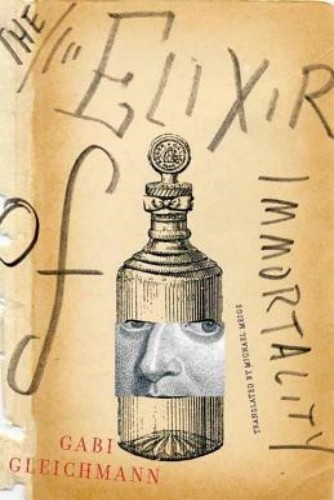
The Elixir of Immortality
A Novel
کتاب های مرتبط
- اطلاعات
- نقد و بررسی
- دیدگاه کاربران
نقد و بررسی

July 15, 2013
This lengthy novel is crammed with history and ideas, yet readers may find the weightiest thing about it is the poundage of the actual volume. The narrator, Ari Spinoza, is a direct descendant of the great philosopher Baruch Spinoza. His great-uncle Franz “Fernando” Scharf (related by marriage) is a prolific storyteller with a vast repertoire of tales about past Spinozas. There is Israel, personal physician to the king of Portugal; his son, Chaim; Moishe the cabalist; and French writer Hector, among others. Many, many famous people from history who are not Spinozas make fleeting appearances as well: Freud, Voltaire, and Goya are but a few. On top of this, the more recent histories of Ari; his twin brother, Sasha; and Franz are recounted, such as Franz’s testy relationship with Ari’s grandmother. Little is ever fully developed, though, leaving this book feeling less like a single, satisfying novel than a summary of many other potentially interesting ones. There are plenty of rich ingredients, but somehow they make for a bland broth rather than a rich stew.

Starred review from July 15, 2013
A charged philosophical novel that ranges across centuries to examine where things went wrong (and sometimes right) in history for the Jews, from the heyday of Moorish Iberia to the collapse of the Berlin Wall. "Our family originated in a mystery and a miracle before almost any of the European nations were created, and we've played a significant role in history without feeling arrogant about the secret knowledge...that we bore with us through various ages and lands." Our narrator relates a millennium's worth of tales surrounding that "secret knowledge," namely the means to stay alive forever. Other alchemical talents include potions of various sorts, including one to fend off treason, another concoction that would find favor in the courts of Europe, where some member of the Spinoza family or another, Zelig-like, is always present. (The omnipresence of figures such as "the Cabalist" has a sharp point.) A best-seller in its birthplace of Norway, publisher and literary critic Gleichmann's novel opens with a dying mother's plaintive remembrance of a blameless young boy's death at the hands of the Nazi occupiers of Oslo; it closes with an evocation of that sad young man, raised in the voice of our narrator, who is threatened with the very loss of that voice. He, like all in his lineage, has a gift of "embellishing the ugly and making the fleeting moment eternal." But can that gift save them? Can they spin the gold of immortality for themselves as well? In a sprawling saga that embraces the likes of the storied kings of Castile and the philosopher Voltaire, Gleichmann has obvious good fun in exploring the implications, as well as the Big Questions, chief among them, "how God could allow such a thing." Full of wit and mystery. Memorable and sure to be one of the big novels of the season.
COPYRIGHT(2013) Kirkus Reviews, ALL RIGHTS RESERVED.

July 1, 2013
In his ambitious debut novel, Gleichmann relates 800 years of the Spinoza family history through the unreliable memories of its last living representative. In every generation, the family has produced a son of exceptional genius who will die a tragic and often brutal death. The Spinozas become involved with the most famous and infamous individuals of European history. One Spinoza is burned at the stake by Torquemada during the Spanish Inquisition, while another loses his head to Robespierre during the French Revolution. Rembrandt paints their portrait; Voltaire tutors their children. Yet through all their tribulations, the eldest son preserves the family secret--the recipe for the elixir of immortality. VERDICT Gleichmann, whose family immigrated to Scandinavia from Hungary, has penned a massive multigenerational saga reminiscent of works by two other Hungarian novelists: Peter Nadas (Parallel Stories) and Miklos Vamos (The Book of Fathers). With its graphic depictions of torture and dismemberment, this book is not for the squeamish reader. However, the panorama of history refracted through the lens of Europe's Jewish community is breathtaking and heartbreaking in turn.--Andrea Kempf, formerly with Johnson Cty. Community Coll. Lib., Overland Park, KS
Copyright 2013 Library Journal, LLC Used with permission.

Starred review from September 1, 2013
An inveterate snoop, Moricz Spinoza sneaks from his father's desk a mysterious old manuscript declaring, The first Spinoza mixed life-giving herbs, and the last Spinoza will let his father's inheritance go up in smoke. Beginning with a medieval court physician reputed to have raised the dead with dove-wing potions, Gleichmann here masterfully spins out the tangled fates of 17 generations of Spinozas, all remembered by one of the family's least distinguished progeny: the dying hoist-driver Ari Spinoza. Ari ponders the fate of a would-be liberator of fellow Jews dying at the Inquisitor's stake, a poetic astronomer perishing in the Black Plague, a sophisticated (and posthumously famous) philosopher excommunicated by his synagogue, a pioneering female physicist committing suicide after her famous lover abandons her, a confused kinswoman boarding a death train bound for Auschwitz, an unswerving communist sent to prison by Stalinist overlords, and, finally, a twin brother perishing in a railyard accident caused by Ari's own mischievousness. Yet in recording his family's travails, Ari finds a healing power by breaking through the suffocating silence of forgetfulness, a power exceeding that of the Cabalistic lore zealously preserved by Moricz's father and his forebears. A supple translation of the Norwegian original conveys the cathartic force of this masterpiece.(Reprinted with permission of Booklist, copyright 2013, American Library Association.)

























دیدگاه کاربران